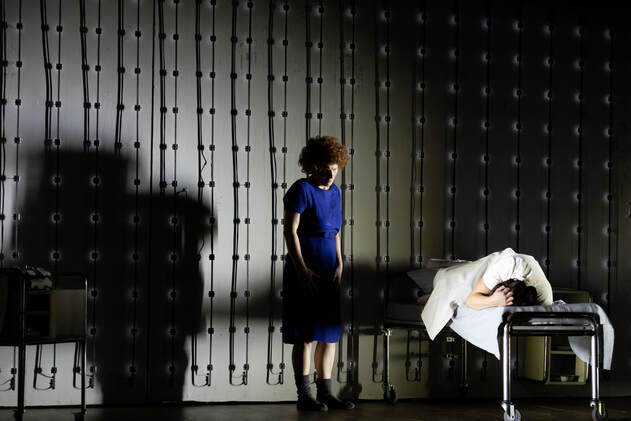 Photo - Petra Mingneau Photo - Petra Mingneau The Strangest of Angels – Composer: Kenneth Young (with Anna Leese); Librettist: Georgia Jamieson Emms New Zealand Opera – Anna Leese, Jayne Tankersley, Members of the Christchurch Symphony Orchestra Conductor – Kenneth Young; Director – Eleanor Bishop There comes a point – the interlude before the third and final scene of Kenneth Young’s new opera The Strangest of Angels – when at last the music sings and dances. The orchestra launches into what almost sounds like a reference to the Habanera from Carmen which then quickly evolves into a tango of distinctive originality and, musically at least, for the first time in this hour-long opera, real personality. Here at last is the composer of Dance (one of my favourite pieces by a New Zealand composer) and Virgen de la Esperanza. Then, as that final scene progresses the musical invention remains at a notably more significant level of importance than seems evident in the earlier scenes. Until that point The Strangest of Angels is primarily about the plot, the characters (NZ writer Janet Frame and fictional Seacliff psychiatric nurse Katherine Baillie), the psychology and the stage performances, while the music, both instrumental and vocal, responds to the narrative rather than drives it. In the first two scenes it’s almost as if librettist Georgia Jamieson Emms has written a play that needs no music. Surely the art of the librettist is, to a large extent, to trust in the composer’s ability to drive the emotional and dramatic impetus of an opera; to know what to put into words and what to leave to the music? So, what we have for the most part is recitative-like, predominantly syllabic vocal parts underlined by an instrumental commentary that reflects what is already expressed in the text and the singers’ performances. These on-stage performances are certainly vocally and dramatically convincing. Anna Leese in particular maintains a full-toned and richly coloured vocal presence and uses both her vocal powers and stage presence to project a convincing and sympathetic character. There are times when the tessitura of her role as nurse Katherine Baillie tends to sit for lengthy periods in the higher range, but that makes the splendour of her lower register all the more dramatically effective when required. The audience responds readily and audibly to her ability to shift quickly from authoritarian aloofness to sarcastic humour, and her attention to every nuance of the text is consistently fluid and detailed. It’s a performance that, in the end, draws us in and earns our sympathy even if the librettist’s characterisation is ambiguous to some degree. In the earlier scenes we are not always sure if she is more Nurse Ratched-like or more genuinely empathetic to Janet Frame’s predicament. As real-life New Zealand writer Janet Frame, Jayne Tankersley is given fewer opportunities to develop a compelling character, particularly for anyone unfamiliar with Frame’s reputation and personal story. But she provides a convincing focus for the plot’s exploration of the social attitudes and medical approaches to mental illness in New Zealand in the early 1950s. Tankersley’s focused vocal quality is rather penetrating at times without the vibrato needed to vary her timbre, but perhaps this is the vocal colour that the composer and writer intended for this role. Tone quality from both orchestra and singers is not helped by the acoustic. Christchurch’s performance venue, The Piano, is known for its opulent and helpful acoustics, but the set for The Strangest of Angels is a (deliberately?) claustrophobic front-stage box that somewhat cancels the spacious aural effect of the open wood-panelled stage. Although this relatively intimate venue was designed primarily for concert-style performances, I have seen several effective theatrical productions here. But with such an enclosed set, and with the fifteen-piece orchestra fitted into the floor space between the front row of seating, the overall acoustic effect emerges as rather dry. Even so, from a visual point-of-view, the set, with its implied electrotherapy lighting effects and its clever use of a revolving panel for scene changes, along with Eleanor Bishop’s supportive and unobtrusive direction, is very effective indeed. The Christchurch Symphony Orchestra players respond to Kenneth Young’s kaleidoscopic instrumental music with flair and commitment. Young’s ear for sonority and texture is realised with playing of often virtuosic and dramatic impact, fearlessly attacked with impressive ensemble. I just wished for some moments of respite from the harrowing pain of the opera’s dramatic framework; something musically uplifting that gives us a sense of hope. At the end, when the hospital equipment is transformed into a typewriter, dramatically we see the light of the successful literary career that Frame pursued after this episode. Should this have also been an opportunity for the music to once again sing with more optimism? Even so, as I leave the theatre I feel privileged to have witnessed the birth of this newest New Zealand opera, which features many moments to savour and even more for us to think about.
0 Comments
Leave a Reply. |
AuthorTony Ryan has reviewed Christchurch concerts, opera and music theatre productions and many other theatre performances since the mid 1990s. ReviewsTony has presented live and written radio reviews of numerous concerts, opera and other musical events for RNZ Concert for many years. An archive of these reviews can be found at Radio New Zealand - Upbeat
His reviews of opera, music & straight theatre and numerous reviews of buskers and comedy festival performances are available at Theatreview. An archive of Tony’s chamber music reviews is held at Christopher’s Classics He has also reviewed for The Press (Christchurch). Links to Tony's Press reviews are listed below: 2024 Songs for Helen – Music by Chris Adams 2022 A Barber and Bernstein Double Bill – Toi Toi Opera The Strangest of Angels – NZOpera Will King (Baritone) and David Codd (Piano) – Christopher's Classics 2019 Ars Acustica – Free Theatre Truly Madly Baroque – Red Priest The Mousetrap – Lunchbox Theatre Iconoclasts – cLoud Last Night of the Proms – CSO 2018 An Evening with Simon O’Neill NZSO Catch Me If You Can – Blackboard Theatre Brothers in Arms – CSO Fear and Courage – CSO Sin City – CSO Don Giovanni – Narropera at Lansdowne Mad Hatter’s Tea Party – Funatorium Weave – NZTrio Tosca – NZ Opera 2017 Sister Act – Showbiz Broadway to West End – Theatre Royal Chicago – Court Theatre Tchaikovsky Symphony No. 5 – CSO Homage – CSO Last Night of the Proms – CSO SOAR – NZTrio Pianomania – NZSO Rogers & Hammerstein – Showbiz Songs for Nobodies – Ali Harper The Beauty of Baroque – CSO Travels in Italy – NZSO Archives
February 2024
Categories |

 RSS Feed
RSS Feed
